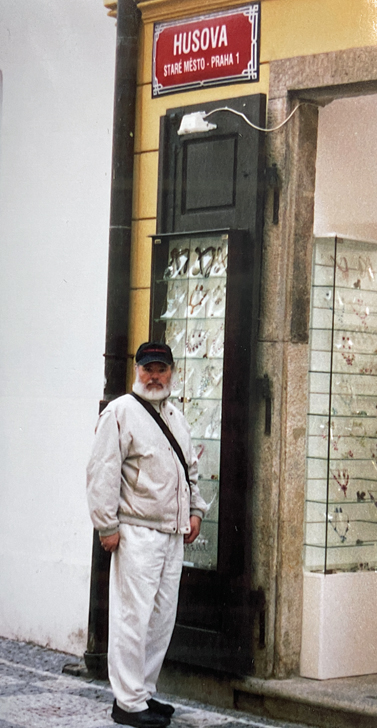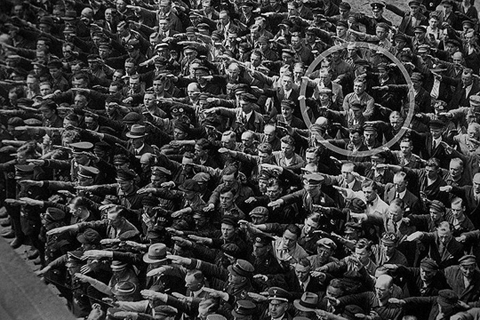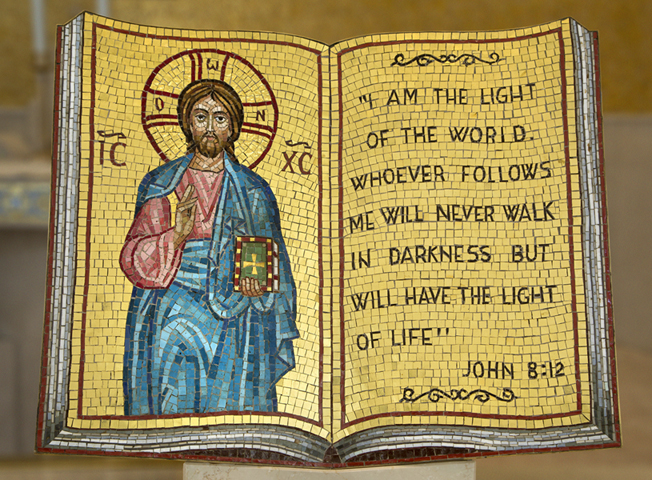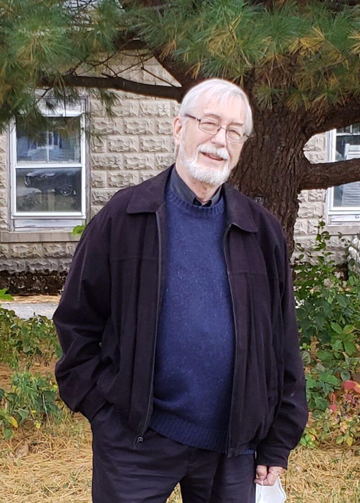July 2021
|
| |

Pastor Marshall standing on Hus Street [Husova]
in Prague, Czech Republic, May 2006, a block from
Bethlehem Church where Hus preached.
|
|
In Prague on July 6, 1415, the Roman Catholic Church
burned at the stake the outspoken priest, Jan Hus, for
advocating regional church rule, that church leaders
make mistakes, and that the laity should receive the
common cup in Holy Communion. Martin Luther wrote that
“the cause of Hus is also mine” (Luther’s
Works
54:81). He believed that he successfully took on his
battles (LW
34:104). Luther therefore said to those on his side “we
are all Hussites” (LW
48:153). And what a blessing that was because Luther
believed that Hus possessed an “extraordinarily great
spirit” (LW
60:126).
May we then on July 6 pray with Hus: “O most kind
Christ, draw us weaklings after yourself, for unless you
draw us we cannot follow you…. Give us a valiant spirit,
a fearless heart, the right faith, a firm hope, and
perfect love” (The
Letters of John Hus,
ed. M. Spinka, 1972, Letter 86, June 23, 1415). And may
we also share his motto: “Nothing is more religious than
obedience unto God” (Jan Hus,
De Ecclesia,
1413 – trans.
The Church,
D. S. Schaff, 1915, p. 237).
‒Pastor
Marshall
|
|
| |
|
PRESIDENT'S REPORT....by
Cary Natiello
By the time you receive this issue of
The Messenger,
I hope you have received the great news that we will
resume indoor worship services effective July 4 at 10:30
a.m. GLORY
BE TO GOD!
It is almost too hard to believe.
Please review carefully the materials sent to you
in the mail prior to attending a worship service and if
you did not receive the materials contact the church
office at 206-935-6530.
Over these past many months, the Church Council has
worked diligently to create a safe and healthy
environment for our return to indoor worship.
Please join me in giving a huge thank you to all
the church council members for their dedication to
working through these difficult times.
Our council members are: Tim Allen, Ben Dobbeck, Janine
Douglass, Jane Harty, Dana Kahn, David King, Larraine
King, Steven Liang, Ron Marshall, Dana Morrison, Phil
Nesvig, Mariann Petersen, and Jeff Sagmoen.
A special thank you to Pastor Marshall who showed great
leadership and objectiveness throughout these past many
months while we worked through these challenging and
unique times, and for his unwavering and relentless
commitment to continue with his responsibilities as
pastor to preach and teach God’s word remotely, and
finally, his providing us an option to continually
receive communion in our homes.
Thanks be to God.
We will continue to monitor the data provided by King
County department of health to ensure that continuing
indoor worship services remains safe for everyone.
While there are still significant costly building
maintenance challenges ahead of us that we are
continuing to process, for now, let’s just focus on the
positive, that we are resuming indoor worship services!
Our Mid-year Congregational Meeting will be July 25,
after the 10:30 am service.
As usual, details about the meeting will be
provided to you prior to the meeting date.
God’s blessings and peace to you all.
|
|
| |
|

Luke 16:15
by Pastor Marshall
Luke 16:15 is a troubling verse ‒ “What is exalted among
men is an abomination in the sight of God.” What shall
we say to this? We like awards, after all, honors,
accolades and especially those small compliments like
“Good job, Harry ‒ way to go!” And then there is our
exaltation of God in worship. Is that also an
abomination? This verse is unqualified and sweeps
away all of our praise. It opposes the crowd (Romans
12:2). Why? Maybe because of John 5:44 ‒- “How can you
believe, who receive glory from one another and do not
seek the glory that comes from the only God?” Because
human glory dramatically excludes divine glory, faith is
ruined. And that’s serious because eternal damnation
follows (John 3:36). So Luke 16:15 comes roaring back.
But a new translation blunts it (Contemporary English
Version,
1995) ‒ “The things that most people think are
important are worthless as far as God is concerned.”
There’s the change we want ‒ that only most of
our exaltations are bad but not all. But that’s not in
the original Greek ‒ το εν ανθρωποις υψηλον ‒ which says
all are bad. Thank God, then, for Martin Luther who
reads Luke 16:15 without inserting any new words into
the verse, but only follows the original! It “teaches,”
he writes, “contempt of the world together with all its
splendor [for] everything [is] worthless” (Luther’s
Works 16:36). Earlier he added regarding this verse
that “it is necessary that we are displeasing… to
ourselves, in keeping with the Word of Christ: ‘He who
loves his life will lose it’ (John 12:25)” (LW
27:181). This is not a message to “curry the world’s
favor but to go out looking for, and quickly to find,
hatred and misfortune, as it is called” (LW
26:58). It will not pack out church buildings in
America. But give thanks to God anyway for Luke 16:15,
because it will open the windows of heaven for you –
which is far more important than using lies to fill up
churches to make them look good (LW 12:255,
Matthew 23:15).
|
|
| |
|

Luther on Ruth
by Pastor Marshall
Martin Luther liked the blessing in Ruth 4:11 on Boaz
and Ruth – “May the Lord make the woman, who is coming
into your house, like Rachel and Leah, who together
built up the house of Israel.” He liked it because in it
he not only saw “the splendor of Christ’s grace,” but
also its extension to both men and women, who together
are “examples of the blessing” (Luther’s
Works 8:176–77).
This is a huge blessing in Israel for “the
consequences of that building up will be extraordinary,
paralleling in importance the founding of the people
through the sons of Jacob” (K. D. Sakenfeld,
Ruth, 1999,
p. 77). Here we also see an “irony of ironies [in a]
patriarchy [bound up] with this Moabite woman who is so
necessary to the greatness of Boaz” (Tod Linafelt,
Ruth, 1999,
p. 75).
|
|
| |
|

(1994)
Saint Paul’s Greek Orthodox Church
Irvine, California
by the artist, Sirio Tonelli (1922-2019)
(photo courtesy, Father S. P. Tsichlis)
|
|
| |
|

IN MEMORIAM – FRITZ NOACK
(1935-2021)
Fritz Noack, one of the most distinguished organ
builders of our time, passed away on June 2, 2021.
Prior to his retirement in 2015, the Noack Organ
Company completed more than 160 organs under his
direction, including instruments for universities,
concert halls, and churches throughout the United
States, as well as Japan and Iceland.
Among these are the two beautiful instruments for
First Lutheran Church of West Seattle, Opus 83 of 18
stops in the gallery (1976) and Opus 142 of 4 stops in
the chapel (2002).
A native of Germany, Fritz Noack apprenticed from
1954 to 1958 with the noted organ builder Rudolph von
Beckerath in Hamburg.
After emigrating to the United States, he worked
in Massachusetts with Charles Fisk, whose own firm later
built the large organ for Benaroya Hall in Seattle.
Fritz founded the Noack Organ Company in 1960,
moving the workshop to its longtime home in a historic
old schoolhouse in the small town of Georgetown,
Massachusetts in 1970.
He had a profound influence on American organ
building in the second half of the 20th and beginning of
the 21st centuries, helping move it toward a more
historically informed perspective.
That influence may be seen both in the
significance of the organs he built, as well as through
the work of the many artistically leading American organ
builders who received their training at his workshop.
I first met
Fritz Noack in the fall of 1974, when I visited two of
his recent instruments in Chicago while he was there
servicing them.
I was immediately impressed with the visual and aural
beauty of his instruments, as well as by his intellect,
wit, and kindness.
Our organ committee had worked for several years
with my predecessor as organist at First Lutheran Church
of West Seattle, and was now ready to make a decision on
who should build the new organ for our church; my trip
to Chicago was occasioned by that process.
Upon my return to Seattle, I recommended
wholeheartedly that the Noack Organ Company be entrusted
to create a new instrument for our church, for which the
contract was signed in early 1975.
A visit to the workshop in Georgetown in June of
1976, when our organ was under construction, brought me
the first taste of the magnificent instrument that would
profoundly shape the musical and worship life of our
parish in the ensuing years.
The gallery organ arrived in Seattle in September
of 1976, and was truly breathtaking, exceeding my
highest expectations.
In the late 1990s when a small organ for the
chapel was being considered, there was never a question
in my mind who should build it.
In March of 2002
the lovely Noack chapel organ was installed, visually
complementing its larger sibling in the gallery.
Thanks be to God!
Andrew King, Cantor |
|
| |
|

EXTENDED MINISTRIES
The Extended Ministry Committee and the Church Council
are highlighting charities that support our community in
order to promote awareness of each organization's
mission and support members of the congregation in their
giving decisions. This issue of
The Messenger
showcases Mary's Place. Mary's Place believes that no
one's child should sleep outside. Built upon a vision
for a community where all families have safety,
stability, and housing, the mission of Mary's place is
to provide safe, inclusive shelter and services that
support women, children and families on their journey
out of homelessness. Established in 1999 with a grant
from Boeing Employee's Community Fund, Mary's Place
Women's Day Center provides two meals a day, hygiene
facilities, showers, laundry, medical care, support
groups, and resources for housing, employment, and
benefits. Since then, they have grown with the support
of the community and local businesses and operate
emergency family shelters around the region and women's
day centers partnering creatively with anyone who shares
their goals. Frequently these shelters rely on vacant,
temporary building space, requiring strong community and
business partnership. More recently, Mary's Place has
been piloting a national best practice called Diversion.
Their website explains that Diversion is an approach
that involves working with families to identify their
strengths and needs coupled with a small amount of
flexible funding, on average $1,900, to address barriers
to housing within 30 days. Mary's Place opened a Family
Diversion Center in June 2019. It has a large compliment
of programs which they are continuously evolving and
innovating. Check out their website to learn more about
their latest services:
https://www.marysplaceseattle.org/
How has the
COVID-19 pandemic impacted Mary's Place and their
mission? Once again, it was the creative support of the
community and local businesses that carried them
through. With the support of Amazon, the Regrade Shelter
opened in March 2020. It was intentionally designed with
private rooms and provided safe, socially distanced
support for families.
‒Dana Kahn, Extended Ministries
|
|
| |
|

What Adam said to Eve
As they lay in the dark.
Honey, what’s making
That dog out there bark?
(Charles Simic, “Left Out
of the Bible,”
The New Yorker,
May 31, 2021, p. 45,
reprinted by permission.)
By Pastor Marshall
First, I like this poem because, Simic, the Serbian
American poet and Pulitzer prize winner from 1990 has
been a long time favorite of mine (see his recent
collection from 2015, The Lunatic). Second, I
like it because it shows that the animal kingdom is
better than we are since it’s the dog who warns them of
the danger “out there” (that Satan’s coming to tempt
them).
Recall also that in Genesis 3 God doesn’t curse the
animals along with the devil (snake), the people, and
the earth. Third, I like it because the question goes
unheeded (as we know) showing how bad we already were
even before our first act of disobedience (eating from
the forbidden tree). Fourth, I like it because the title
says that this poem (and its warning) isn’t needed
(being “left out”). This too points to our deep
corruption skipping over all warnings. And fifth, I like
it because the rhyme and meter in this poem give it a
humor that is acerbic because of the message it helps to
convey.
|
|
| |
|
Proverbs 21.1
Monthly Home Bible Study,
July 2021, Number 341
The Reverend Ronald F. Marshall
Along with our other regular study of Scripture, let us
join as a congregation in this home study. We will
study alone
then talk informally about the assigned verses together
as we have opportunity. In this way we can “gather
together
around the Word” even though physically we will not be
getting together (Acts 13.44). (This study uses the RSV
translation.)
We need to support each other in this difficult
project. In 1851 Kierkegaard wrote that the Bible is “an
extremely dangerous book.... [because] it is an
imperious book... – it takes the whole man and may
suddenly and radically change... life on a prodigious
scale” (For
Self-Examination). And in 1967 Thomas Merton wrote
that “we all instinctively know that it is dangerous to
become involved in the Bible” (Opening
the Bible). Indeed this word “kills” us (Hosea 6.5)
because we are “a rebellious people” (Isaiah 30.9)! As
Lutherans, however, we are still to “abide in the womb
of the Word” (Luther's
Works 17.93) by constantly “ruminating on the Word”
(LW 30.219) so that we may “become like the Word” (LW
29.155) by thinking “in the way Scripture does” (LW
25.261). Before you study then, pray: “Blessed Lord, who
caused all Holy Scriptures to be written for our
learning: Grant us so to hear them, read, mark, learn
and inwardly digest them, that we may embrace and ever
hold fast the blessed hope of everlasting life, which
you have given us in Our Savior Jesus Christ. Amen”
(quoted in R. F. Marshall,
Making A New
World: How Lutherans Read the Bible, 2003, p. 12).
And don’t give up, for as Luther said, we “have in
Scripture enough to study for all eternity” (LW
75:422)!
Week I.
Read Proverbs 21.1
noting the line
the Lord… turns it wherever he will. What is the
divine power like? On this read Psalm 115.3 noting the
line God… does
whatever he pleases. How is God able to do that
without any interference? Check out Isaiah 55.9 noting
how God’s ways
are higher than ours. How does that give God extra power? Read Psalm
62.11 noting the line
power belong to
God. Does that mean God does everything? On this
read 1 Corinthians 3.6 – 7 noting the words
planted,
watered,
growth and only. So God
doesn’t do everything but he controls everything. How is
that? Read Proverbs 19. 21 noting the contrast between
plans and
purposes,
mind and established. How
is God in charge of what finally happens? Check out
Philippians 1.6 noting the word
completion.
How is that out of our hands? Can only God control what
people will think of what we do? On this read Joshua
2.11 noting the line
hearts melted…
because of you. Only God controls the fear that
changes the way we think. Do you agree?
Week II.
Read again
Proverbs 21.1 noting the same line
the Lord… turns it wherever he will. But can’t we
thwart God through brute force as in wars and physical
abuse? On this read Psalm 46.9 noting the words
wars and
cease.
According to this verse, wars can’t obstruct God’s ways.
But why do some wars seem unending? Can God stop only
some of them? Check out Ezekiel 14.21 noting the word
sword which is
an euphemism for wars. Does that explain it? Apparently
God sends wars to punish us. As long as the punishment
is to last, God keeps the war going. So raging wars
aren’t a sign that God is being thwarted. On abuse read
1 Peter 2.18–20 noting the words
overbearing,
unjustly, credit and
approval.
Inflicting pain like this is part of God’s plan, not the
interruption of it. On this read Matthew 5.46 noting the
low achievement of
tax collectors
loving only those who first love them. Believers in
Christ have a higher standard – loving those who are
mean to them. Do you buy into turning vices into virtues
like this?
Week III.
Reread Proverbs
21.1 noting this time the line
the king’s heart is a stream of water in the hand of the
Lord. But what about the bad ones? Can God control
them too? On kings read 1 Samuel 8.10–18 noting the
words ways, reign,
appoint,
cry, not and
answer and the
five uses of the word
take. Why is
God so unloving to them simply because they wanted kings
like all the nations around them? Check out 1 Samuel 8.7
noting the line
they have rejected me from being king over them.
Read also Hosea 8.4 noting the line
they made kings,
but not through me. Kings, then, are a punishment.
So allowing them to abuse people isn’t a sign that God
can’t control them. Take King David. He committed
adultery and murder, but God allowed David and Bathsheba
to stay together, according to 2 Samuel 12.15–25, so
that Solomon could be born next, whom
the Lord loved. What other value did Solomon have? Read 1 Kings
5.3–5 noting the two contrasting lines
could not build
and I purpose to
build. What did God think of his temple? Read 1
Kings 9.3 noting the word
consecrated.
How does this fit with John 2.21?
Week IV.
Read Proverbs 21.1
one last time noting the same line
the king’s heart
is a stream of water in the hand of the Lord.
Because kings have wealth and military power they seem
unstoppable. So how does God control them? On this read
Matthew 27.19 noting the words
nothing,
suffered,
much and dream. How can a
dream do that? Why not just ignore it as a silly
thought? How can dreams frighten us into changing our
behavior? Check out Genesis 37.3–5 noting the line
they only hated
him the more. This happened by combining
pre-existing jealousy with a dream. So dreams take on
more power than they have by being linked up with other
bad feelings. Other times God is more direct, as in 1
Samuel 16.14. Check out the
evil spirit
that he sends to
torment King Saul. How odd is that?
|
|
| |
|

Crystal Tudor on her 100th Birthday,
May 28, 2021.
Crystal joined FLCWS on December 14, 1952.
|
|
| |
|
The next Zoom book discussion will be on Sunday, July 17
at 3:30 pm. The book is Reading While Black
(2020) by Esau McCaulley.
|
|
NEXT: Koran Class with Pastor Marshall on ZOOM is
scheduled for Mondays at 7 pm, July 5, 12, 19, 26.
|

|
| |
|
Philippians
The Apostle Saint Paul
“Whatever is just and pure,… think
about these things.”
(4:8)
by Pastor Marshall
This verse maintains a place for moral diligence in
Christian living. Even though Christians hope “never to
be seized and stirred by those things that are
displeasing to God the Father,…. that is impossible in
this life.” Therefore the law also has to be taught “to
the godly in order to admonish and encourage them to
stay to the end in the battle and contest and not to
allow themselves to be overcome by the barking and
insolence of their flesh” (Luther’s
Works 73:178–79). But Luther also knew that our
righteousness before God doesn’t depend on this
diligence because “man is justified by faith apart from
works of the law” (Romans 3:28). Luther quite rightly
then distinguished between our external, public life,
and our inner life of faith which is hidden “with Christ
in God” (Colossians 3:3). Regarding that external life,
“a Christian should not think he can do whatever he
wants, regardless of whether he pleases no one or
everyone. He should do that only in matters of faith. In
his external life he should act so that people find
nothing to reproach in him, but everyone is pleased (1
Corinthians 10:33, 1 Peter 2:12)” (LW
76:234).
This battle is mostly over correct Christian
teachings (Ephesians 4:14). So the pursuit of justice,
purity and excellence in Philippians 4:8 “refers chiefly
to the teaching… so that both the preaching office would
remain pure and [Christians] would remain in true faith.
When these are correct, then the teaching and the
results of the works afterward can also be correct” (LW
79:266). But again we have to be careful with these
achievements. “They can make no more progress than that
here on earth it is called praiseworthy and honorable
before the world. However, it has no value before God
and cannot attain to that life, but finally leaves a man
stuck in shame, so that death devours him and drags him
off to hell.” That said, “in obedience to God, these
fruits are to follow in this life on earth in those who
believe in Christ and now have their righteousness in
Him. They are also good works which are pleasing to God
and which He, for the sake of their faith, because they
are done in Christ, will also reward in the life to
come” (LW
79:272). So these good works are worthless and rewarding
simultaneously. That can leave us confused and
irritated, exclaiming – “How dare you” (LW
32:85)!
Even irritating, these ideas remain important
because “wicked deeds are generated from wicked
thoughts,” so we have to preoccupy ourselves with worthy
thoughts that we may walk more resolutely in
righteousness (John Chrysostom,
Homilies on
Philippians, trans. P. Allen, 2013, p. 289). And
this is true even if some of these ideas show “points of
commendation and agreement… between the culture and the
church” (Fred Craddock.
Philippians,
1985, p. 73). Indeed the virtues listed in Philippians
4:8 “are not specifically Christian; they are excellent
and commendable wherever they are found. But in a
Christian context such as they are given here they take
on the distinctive nuances associated with the mind of
Christ [Philippians 2:5]” (F. F. Bruce,
Philippians,
1989, p. 146). Indeed, Christians are to “have respect…
for everything that is humanly true and good…. The whole
moral world exists as truly as does the natural world,
so to speak as its upper half…. The world knows very
well what is good. Christians are to know it too, [not]
less well than the world but better. But knowing… is
knowledge… only when the Good… is kept…. That is what is
specifically Christian – do that! Christianity is not
ethics, nor does it have any special ethic. As
Christians, too, we can only think on what everyone has
to think on…. [But then you also] are to do what you –
else you were not you – are commanded” (Karl Barth,
Epistle to the
Philippians, 40th Anniversary Edition, trans. J. W.
Leitch, 2002, pp. 124–25).

|
|
|